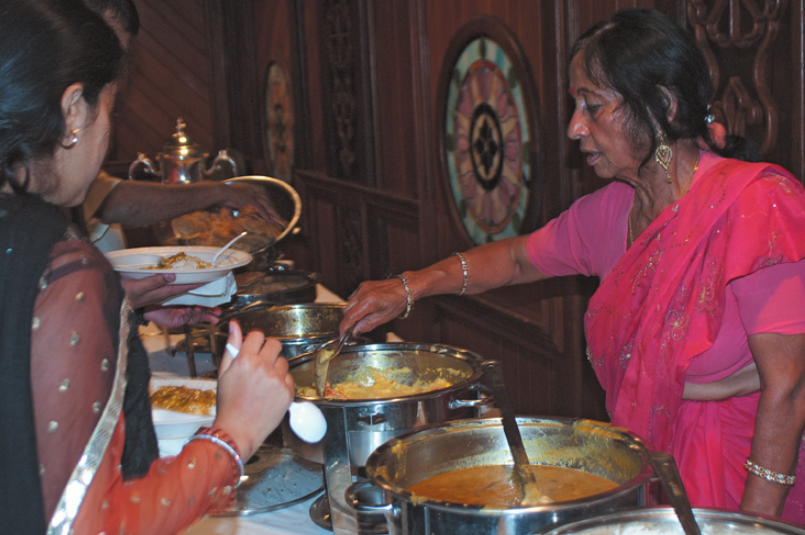
Sunday is not just another day of service to the twenty fi ve devotees that live at the temple or the more than a hundred additional (about 30 families) that call 2936 their place of worship; Sunday is also the day when the weekly feast occurs. This feast at the Krishna Temple, the hoi polloi and the elite will take prasada, food prepared in the name of God and given freely to any and all who are hungry. On Sunday there will be cooking for four hundred people and if the food runs out, more will be cooked. The fi rst question I had to ask was, "Do that many people come to eat because the food is that good or is our economy that bad?" The answer is yes.
The followers of ISKON, or as they are more commonly referred to, The Hari Krishnas, are instructed by their spiritual master to make food in the name of holy service and to serve it forth; indeed, they are instructed that no person within 10 km of any temple should ever go hungry. Breakfast, lunch or dinner. 365. And so they cook. Whatever you think of their religion or methodology of the gathering of funds, consider: 20,800 hungry people are fed at the Sunday feasts alone. I was one of them.
It should also be noted that 600 students at The Henry Ford School in Avondale receive fresh fruit twice a week? As well as the Big Easy Episcopal Church at 2229 Ursuline St. receives food weekly. And from 2006-2011, the Lower Nine Organization received food from the Krishnas every day for the volunteers that were rebuilding our city, until they were not needed anymore. The list continues: the New Orleans Women's Shelter, the Chapel of the Holy Redeemer, the New Orleans Mission. Food is also offered free, although donations may (and should) be made, on Jazz Fest days. Food dedicated to God and given freely.
The food they provide is vegetarian fare because the Hari Krishnas do not eat or kill animals. They consider all living things part of God and worthy of life. Many consider this bunk; I don't think it is, that is, when I thought about it. The meals that I've taken part with on Sundays, I'd consider to be on par with standard restaurant quality. My girlfriend and I arrive early, we bring our own plates, wait patiently for the doors to open and go through the serving line. We are greeted and respond with respect and courtesy. And we donate so that more food can be purchased and cooked, paying it forward so to speak. All are welcome to attend services, which consists of chanting and dancing. There is the beating of drums and the ringing of fi nger cymbals; it's not everyone's cup of tea and it is not something that is pushed, only invited.
This is not an advertisement for these people; indeed, the neighbor across the street from the temple is a wet hen on Sundays whenever one of the unsuspecting guests parks their bicycle on his fence. Yells. Calls the police. The whole nine yards. The neighbor next door is also not excited about four hundred people showing up for food outside of his home; however, he's a lot more patient.
The religion that I was raised in has a holiday where we feed everyone who comes by. It falls on Saint Joseph's Day. It is the day that the God in the people preparing the food, feed the God in the people that are hungry. All in the name of God. It's not a concept that has ever sounded foreign to me, and so, it's never sounded odd that a similar feast is laid out every Sunday at a temple devoted to the Hindu God.
The whole reason that I'm writing this is just to tug on your coattail. New Orleans is not, nor has it been for a while, black and white. The Krishna Temple opened its doors in 1966. There is also our Vietnamese community, well established, that bears recognition and respect. And now we have Salvadorians, Hondurans and other Hispanic enclaves. These are ingredients to our great urban gumbo that we call the people of New Orleans. It's all our differences that make us the same people; few of us go around wearing two catchers' mitts, if you get my drift, we give what we can and take what we need from each other.
The street that I live on is ethnically and culturally diverse as is, I'd bet, yours. On any given day, I'm on my porch, newspaper in hand and a cup of coffee within easy reach. "Mornin' Darlin'!" I yell to my neighbor Judy. "Where Y'at?" I call to Dallas across the street. "Hey neighbor!" to Gallivan next door and "Howya doin'!" to the older guy down the street that collects aluminum cans to supplement his income. Also across the street I have neighbors from India that I see at Temple on Sunday and on our street every day; the greeting that we share means from the God inside of me to the God inside of you. Try it sometime: "Namaste."
This is the season that we tout "Peace on Earth and good will toward all". These are not just words to be practiced in December. Can I get an amen?


